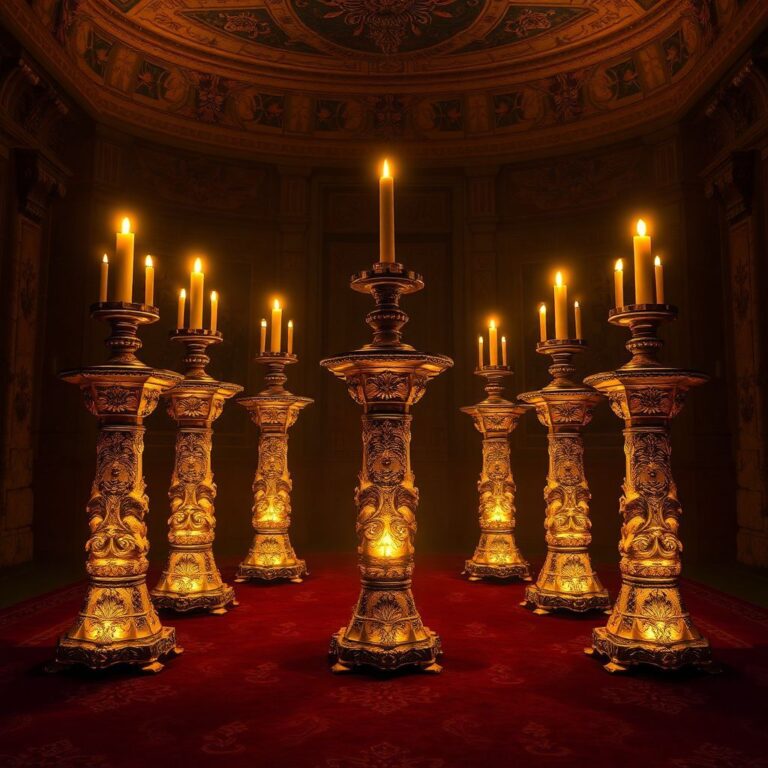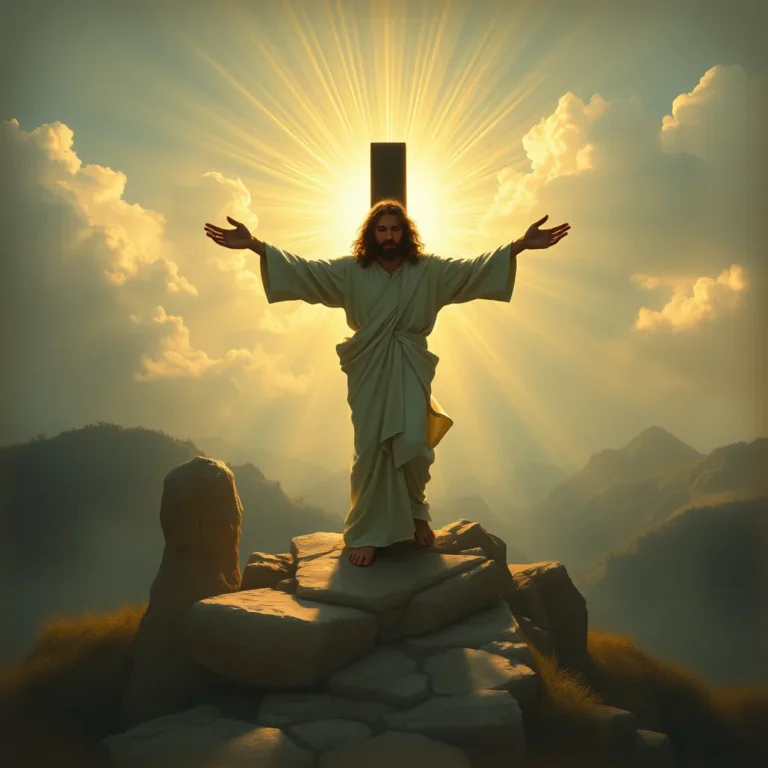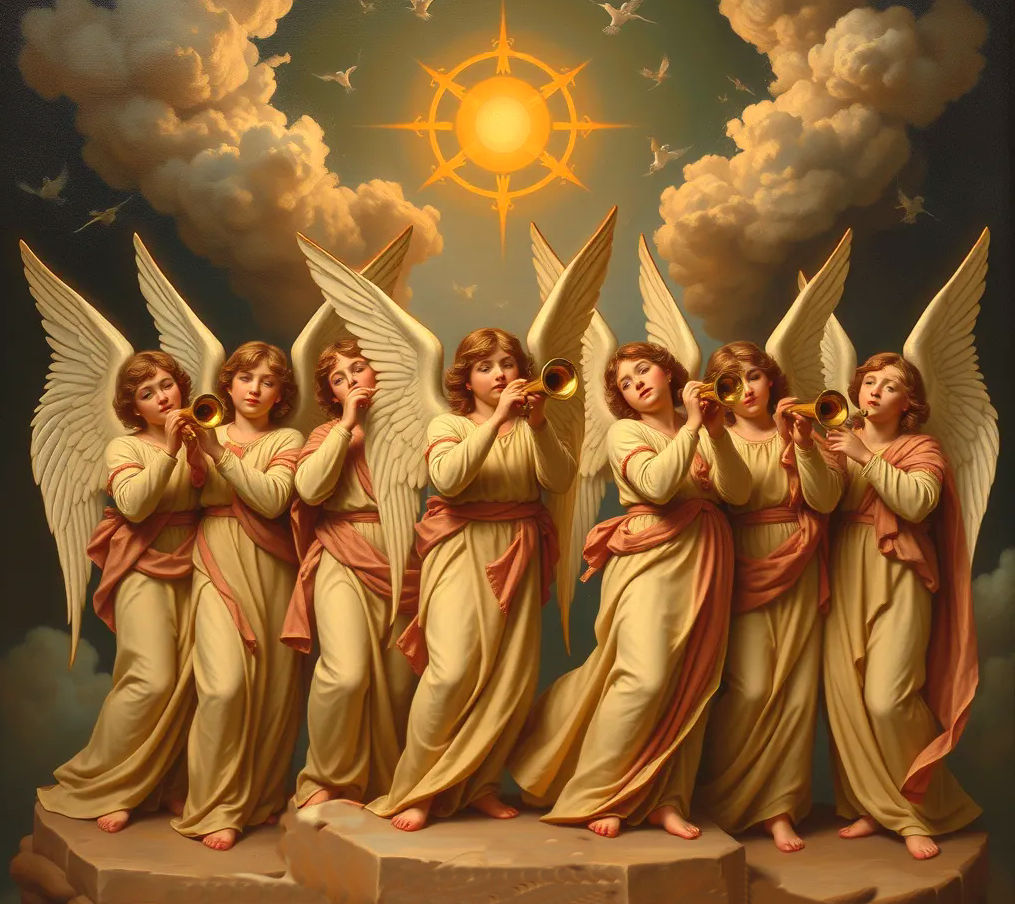
Chapter Seven proclaims that all believers are sealed to God, saving them from the judgments that will fall on the rebellious. The book of creation’s destiny is opened, and God’s plan is fully revealed.
With the opening of the seventh seal, it would be expected that the end would come. Instead, a new series of visions begins to unfold to John. When the seventh seal is opened, “seven trumpets” will be sounded, and then “seven bowls” of God’s judgments will be introduced; the final obliteration of “Babylon” will be witnessed, and the last battle will rage.
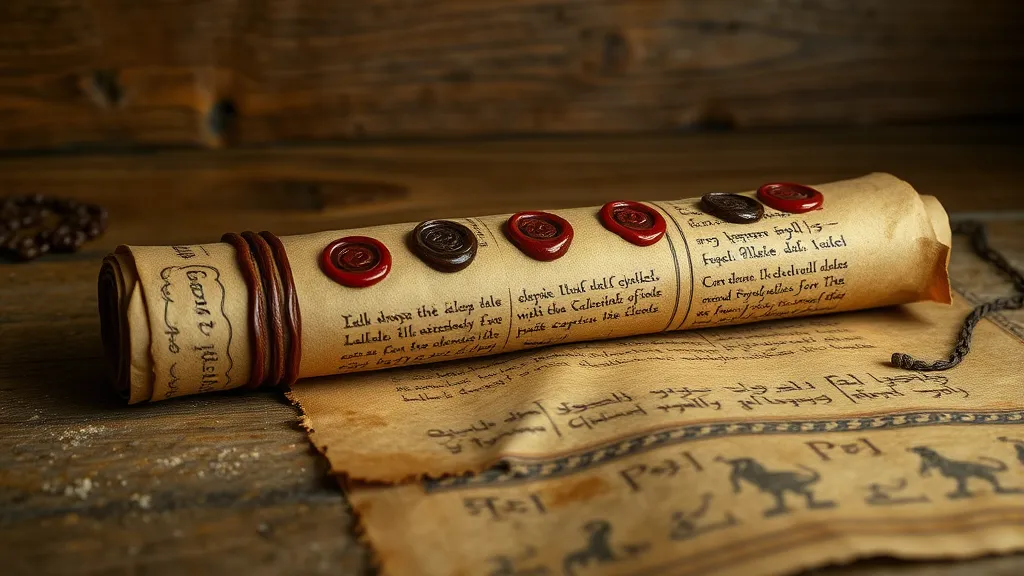
Once again, it’s easy to assume that the events John sees are revealed in chronological order. He states that the events are to happen soon, and readers usually suppose that John has recorded them in their historical sequence. But this does not seem to be the case.
- The birth of the Messiah is not represented until Chapter 12.
- The seven-headed beast from the sea, five heads representing kings already dead – is seen in both chapters 13:1 and 17:10.
- The persecution of the saints is witnessed in 11:7-10 as well as 13:7-18.
- The final Wrath of God is recorded in 15:1, yet the judgment on Babylon is not seen until 16:19.
As his vision continues to unfold, John witnesses three scenes in groups of seven. These seven-fold visions of seals, trumpets, and bowls are broad views of the entirety of God’s judgment.
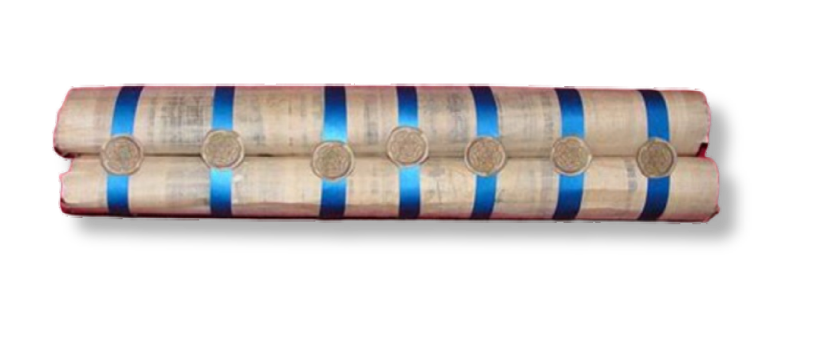
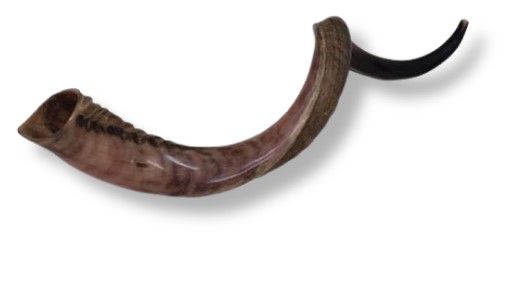

The opening of these three sets of judgments illustrates the consequences that await those who deny God and persecute His believers, repeated three times using different imagery.
In contrast, chapters 12-14 provide a detailed close-up of the events rather than being arranged in groups of seven.
(*All Bible verses are from the NIV unless otherwise noted)
Chapter 8
1 When he opened the seventh seal, there was silence in heaven for about half an hour.
2 And I saw the seven angels who stand before God, and seven trumpets were given to them.
3 Another angel, who had a golden censer, came and stood at the altar. He was given much incense to offer, with the prayers of all God’s people, on the golden altar in front of the throne.
4 The smoke of the incense, together with the prayers of God’s people, went up before God from the angel’s hand.
5 Then the angel took the censer, filled it with fire from the altar, and hurled it on the earth; and there came peals of thunder, rumblings, flashes of lightning and an earthquake.
Rev 8:1
When he opened the seventh seal, there was silence in heaven for about half an hour:
In Chapters 5 and 6, John is shown a scroll with seven seals – God’s plan of redemption. He despairs that no one can open it. If the scroll can’t be opened, evil won’t be condemned and will continue to infect the earth. He is then told that only the Lamb of God is capable of fulfilling God’s plan.
Christ is the essence of a two-edged sword. If mankind accepts him, it finds redemption; if it rejects him, it tumbles into catastrophe and judgment, illustrated by the “four horsemen.”
Chapter 7 represented a pause in the narrative, and John was shown those redeemed by God’s grace, illustrated by the 144,000.
Now, the seventh seal is opened, continuing the flow of events. However, instead of witnessing a flood of culminating judgments, John experiences a profound silence “for about half an hour.” Silence in Scripture usually indicates prayer, submission, and anticipation:
Hab 2:20 The LORD is in his holy temple;let all the earth be silent before him.
Zech 2:13 Be still before the LORD, all mankind, because he has roused himself from his holy dwelling.”
Job 6:24 “Teach me, and I will be quiet; show me where I have been wrong.
Eccl 9:17 The quiet words of the wise are more to be heeded than the shouts of a ruler of fools.
Ps 37:7 Be still before the LORD and wait patiently for him…
Ps 46:10 He says, “Be still, and know that I am God; I will be exalted among the nations, I will be exalted in the earth.”
Rev 8:2
And I saw the seven angels who stand before God, and seven trumpets were given to them:
Ancient Israel sounded trumpets as a call to battle, to warn of coming danger, and to signal celebration:
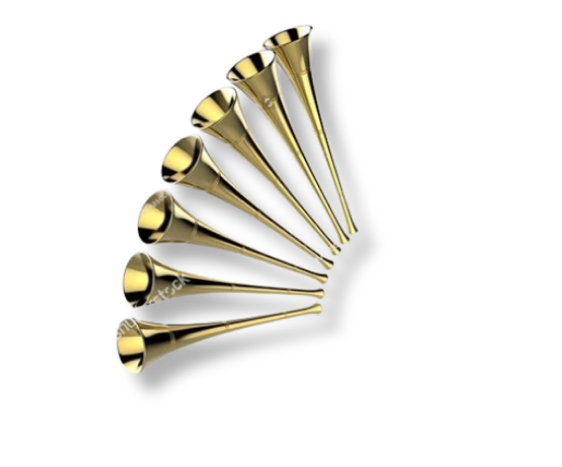
Num 10:8 “The sons of Aaron, the priests, are to blow the trumpets. This is to be a lasting ordinance for you and the generations to come. 9 When you go into battle in your own land against an enemy who is oppressing you, sound a blast on the trumpets. Then you will be remembered by the LORD your God and rescued from your enemies.
1 Chron 15:24 Shebaniah, Joshaphat, Nethanel, Amasai, Zechariah, Benaiah and Eliezer the priests were to blow trumpets before the ark of God. Obed-Edom and Jehiah were also to be doorkeepers for the ark.
Neh 12:40-41 The two choirs that gave thanks then took their places in the house of God; so did I, together with half the officials, 41as well as the priests—Eliakim, Maaseiah, Miniamin, Micaiah, Elioenai, Zechariah and Hananiah with their trumpets—
Josh 6:4 Have seven priests carry trumpets of rams’ horns in front of the ark. On the seventh day, march around the city seven times, with the priests blowing the trumpets.
Rev 8:3
Another angel, who had a golden censer…was given much incense to offer, with the prayers of all God’s people:
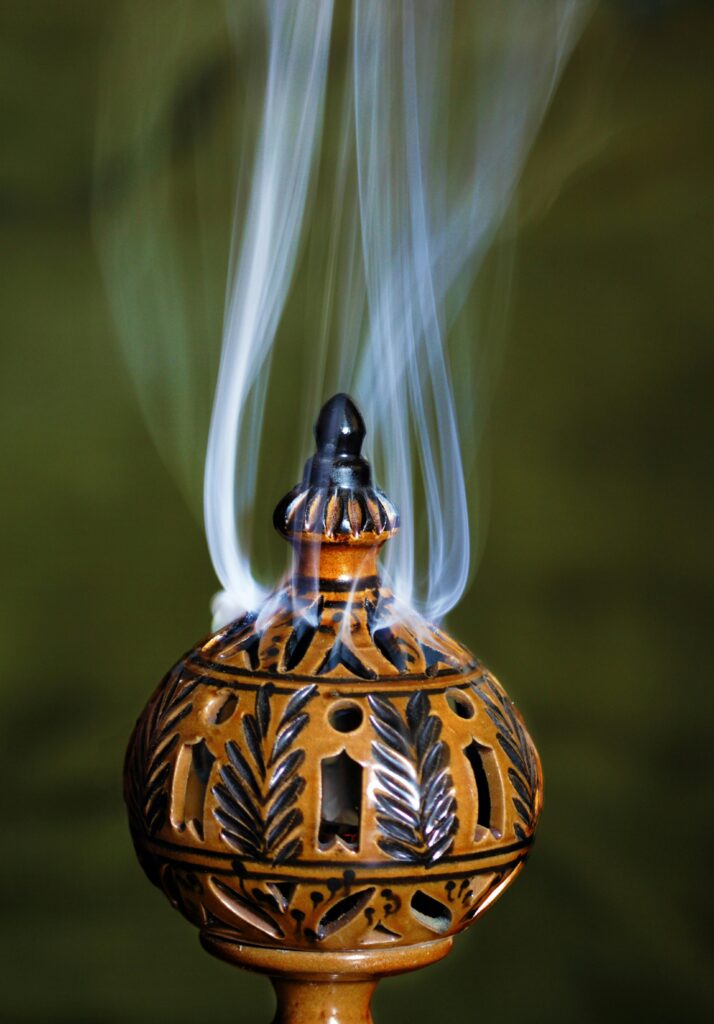
Rev 5:8 identified the rising smoke of incense as “the prayers of God’s people”. The use of incense was a major part of ancient Israel’s religious practice in the Temple but was not normally a part of early Christian practices. Pagans used incense during their sacrifices and in honoring the emperor as a deity, so early Christians typically avoided using it in their own religious celebrations. It wasn’t until the 4th or 5th century that incense started being used again in ordinary Christian worship and continues as part of worship in many churches such as the Roman Catholic Church, Eastern Catholic, Orthodox, Lutheran, and some Anglican Churches1.
Exod 30:8 He must burn incense again when he lights the lamps at twilight so incense will burn regularly before the LORD for the generations to come.
Ps 141:2 May my prayer be set before you like incense; may the lifting up of my hands be like the evening sacrifice.
Rev 8:5
Then the angel took the censer, filled it with fire from the altar, and hurled it on the earth:
The “fire of God” can be used in a literal sense:
Lev 9:23-24 Moses and Aaron then went into the tent of meeting. When they came out, they blessed the people; and the glory of the LORD appeared to all the people. 24 Fire came out from the presence of the LORD and consumed the burnt offering and the fat portions on the altar. And when all the people saw it, they shouted for joy and fell facedown.
2 Chron 7:1 When Solomon finished praying, fire came down from heaven and consumed the burnt offering and the sacrifices, and the glory of the LORD filled the temple.
God’s consuming fire is also used symbolically to illustrate His mighty power and judgment:
Isa 66:15 See, the LORD is coming with fire, and his chariots are like a whirlwind; he will bring down his anger with fury, and his rebuke with flames of fire. 16 For with fire and with his sword the LORD will execute judgment on all people, and many will be those slain by the LORD.
Leviticus 9:24 states, “Fire came out from the presence of the LORD and consumed the burnt offering and the fat portions on the altar. And when all the people saw it, they shouted for joy and fell facedown.” The fire on the altar served as a constant reminder of God’s presence and power.
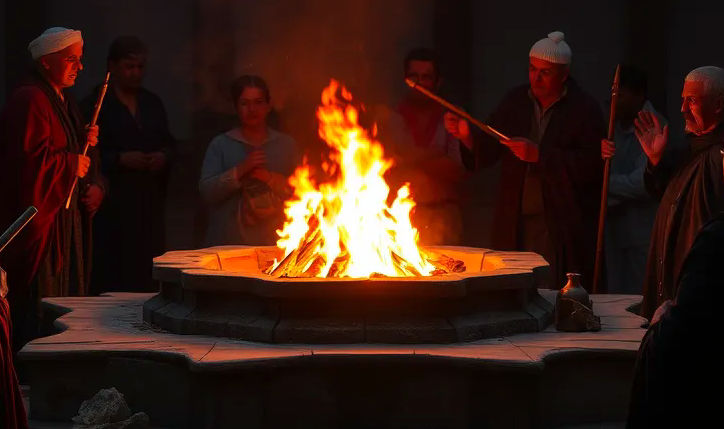
No other source of fire was acceptable to God. Leviticus 6:13 instructs, “The fire must be kept burning on the altar continuously; it must not go out.” This is repeated three times (verses 9, 12, and 13).
This same fire was kept burning by the priests and carried from place to place to start other holy fires—flames that originated directly from God—a constant reminder that atonement for the people’s sins could only come from Him.
The sacrifices offered on His altar were not meant to feed God, as many pagans believed. He needs nothing from us and desires only our hearts turned toward Him in love and charity toward others:
Isaiah 1:11 “The multitude of your sacrifices—what are they to me?” says the LORD.“I have more than enough of burnt offerings,of rams and the fat of fattened animals;I have no pleasurein the blood of bulls and lambs and goats.
Isaiah 1:14-17 14Your New Moon feasts and your appointed festivalsI hate with all my being.They have become a burden to me;I am weary of bearing them. 15When you spread out your hands in prayer,I hide my eyes from you;even when you offer many prayers,I am not listening.Your hands are full of blood! 16Wash and make yourselves clean.Take your evil deeds out of my sight;stop doing wrong. 17Learn to do right; seek justice.Defend the oppressed.Take up the cause of the fatherless;plead the case of the widow.
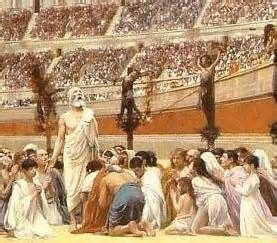
Believers throughout the Roman Empire had been suffering persecution, torture, and death. John sees the angel take the censor of incense (the pleading prayers of the saints rising to the Father), fill it with fire from the altar (God’s consuming presence), and hurl it to the earth! God hears his people’s prayers and responds. The final voice of judgment will be heard by those who reject His redeeming love through Christ. Evil, perpetrated by individuals, communities, or nations, always reaps loss and destruction. John will see this as the next angels sound their trumpets!
Rev 8:5
Peals of thunder, rumblings, flashes of lightning and an earthquake:
Isa 30:30 The LORD will cause people to hear his majestic voice and will make them see his arm coming down with raging anger and consuming fire, with cloudburst, thunderstorm and hail.
Compare what John is witnessing to the rich symbolic language used in 2 Sam 22:7-16:
2 Sam 22:7 “In my distress I called to the LORD; I called out to my God. From his temple he heard my voice; my cry came to his ears. 8 The earth trembled and quaked, the foundations of the heavens shook; they trembled because he was angry. 9 Smoke rose from his nostrils; consuming fire came from his mouth, burning coals blazed out of it. 10 He parted the heavens and came down; dark clouds were under his feet. 11 He mounted the cherubim and flew; he soared on the wings of the wind. 12 He made darkness his canopy around him— the dark rain clouds of the sky. 13 Out of the brightness of his presence bolts of lightning blazed forth. 14 The LORD thundered from heaven; the voice of the Most High resounded. 15 He shot his arrows and scattered the enemy, with great bolts of lightning he routed them. 16 The valleys of the sea were exposed and the foundations of the earth laid bare at the rebuke of the LORD, at the blast of breath from his nostrils.
It’s unlikely that these verses depict actual geological events. Instead, they describe God’s incomparable power through the most powerful descriptors available to the ancient prophets.
Footnotes
- Emily Sanna, Why do Christians use incense? Published August 27, 2015, https://uscatholic.org/articles/201508/why-do-christians-use-incense/, accessed Feb. 2, 2024. ↩︎
*All Scripture quotations, unless otherwise indicated, are taken from the Holy Bible, New International Version®, NIV®. Copyright ©1973, 1978, 1984, 2011 by Biblica, Inc.™ Used by permission of Zondervan. All rights reserved worldwide. www.zondervan.comThe “NIV” and “New International Version” are trademarks registered in the United States Patent and Trademark Office by Biblica, Inc.™


